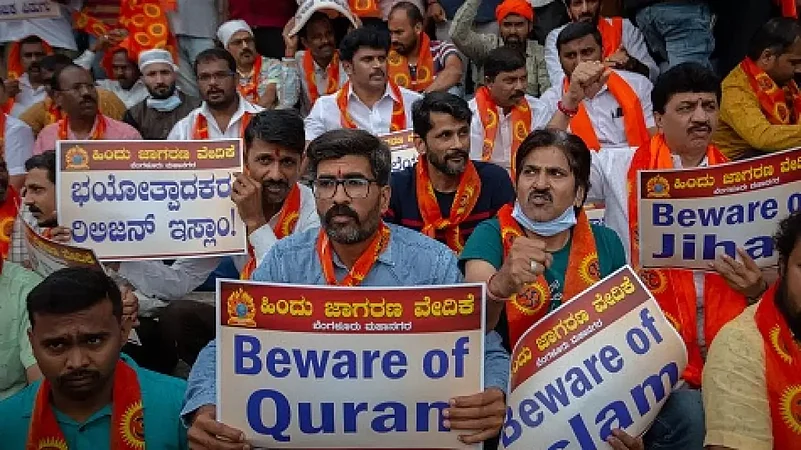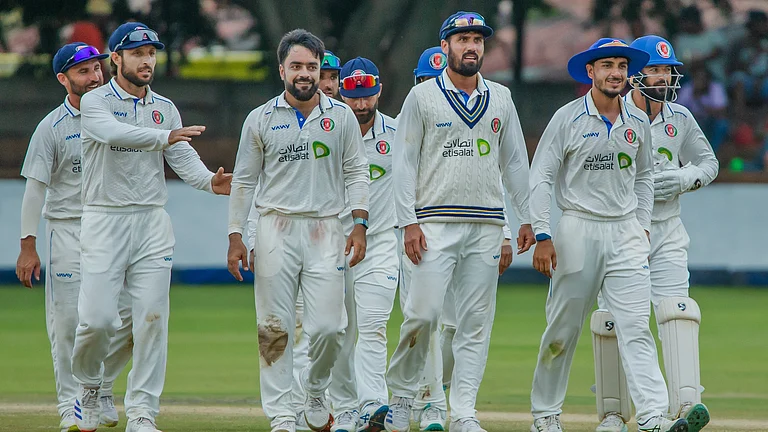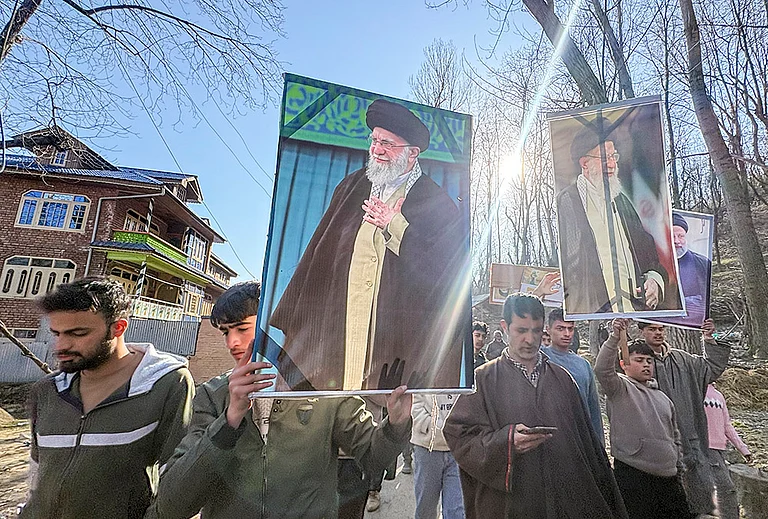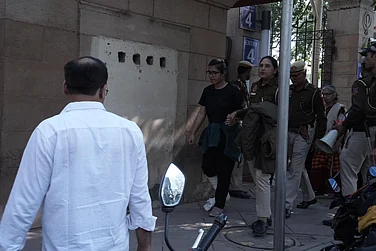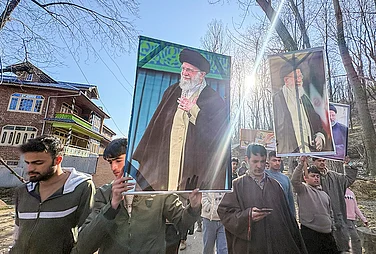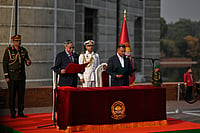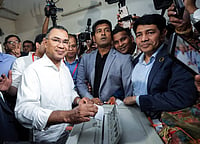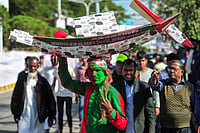The announcement of militant Hindutva outfit’s leader, Pramod Muthalik of the Shri Rama Sene (SRS), of putting up candidates against the BJP in over a dozen seats in the Karnataka state assembly election, has not come as a surprise. He has accused the saffron party of practising “fake Hindutva”. Even his comment in early March, asking people to beat up BJP leaders with their slippers if they came seeking votes in the name of Prime Minister Narendra Modi, was not out of the ordinary.
“Don’t come seeking votes in the name of Modi. Seek votes in the name of what you have done here with regard to cows, love jihad and Hindu Rashtra,” Muthalik told a gathering and suggested they throw slippers on local BJP leaders.
Hindutva one-upmanship
Since the beginning of April, Muthalik has been quoting from a list of alleged benami (illegal) properties owned by V Sunil Kumar, the state energy minister and sitting BJP MLA who is also the party’s nominee from Karkala, the seat that Muthalik has chosen to contest. Corruption, in fact, tops the Congress’ campaign agenda against the incumbent BJP MLA in Karkala―a constituency in the neighbouring Udupi district that was at the centre of the hijab ban controversy at educational institutes last year.
Karkala is a part of coastal Karnataka. It belongs to a region―along with the districts of Dakshina Kannada and Uttara Kannada―that has long earned the reputation of being the ‘Hindutva laboratory’ of south India. In recent years, the Basavaraj Bommai government has presented the country with the third model of Hindutva rule, after Narendra Modi’s Gujarat and Yogi Adityanath’s Uttar Pradesh.
Muthalik is a former RSS pracharak who served in many Sangh Parivar organisations―lastly in the Bajrang Dal. He quit the RSS in 2004 and launched his own organisation the next year. His charge: the Sangh Parivar organisations, including the BJP, were not doing enough to establish Hindu Rashtra.
He gradually earned a reputation of notoriety within his own parivar. He was accused of a number of incidents, including blasts, hate speeches targeting Muslims and Christians, threats to pull down mosques, attacks in pubs and Valentine's Day celebrations. A love-hate relationship developed between him and the Sangh Parivar.
Gujarat chief minister Narendra Modi’s rise in the BJP ahead of the 2014 Lok Sabha elections made this ‘ardent admirer of Modi’s hardline Hindutva’ hopeful of an entry to the BJP, but it did not fructify. In March 2014, the Karnataka BJP formally inducted him, only to throw him out within five hours after party president Rajnath Singh disapproved of the induction. Perhaps, they considered him too hot to handle.
Even with PM Modi reigning supreme in the BJP, Muthalik did not find his way into the BJP. The BJP-ruled Goa government imposed a ban on his entry multiple times, in 2014, 2015, and 2020. His movements were restricted in BJP-ruled Karnataka as well. All this while, he has taken provocative propaganda to higher pitches and pushed Sangh Parivar outfits to go further.
“The BJP is sidelining real Hindutva warriors like T Raja Singh (suspended BJP MLA from Telangana), Sathyajit Surathkal, and Arun Kumar Puthila (from Dakshina Kannada district in Karnataka). Instead of pushing harder for Hindu Rashtra, they are leaning towards secularism,” Muthalik told Outlook.
“I have a two-fold agenda against the BJP. First, they are sacrificing the interests of the Hindus for their electoral equations. Second, the BJP is the most corrupt party in Karnataka,” says Muthalik, who was ready to support the BJP in other constituencies in exchange for their support for him in Karkala.
Puthila, who was Muthalik’s right-hand man at Shri Rama Sene, had managed to find entry into the Sangh Parivar after 2014. This time, after being denied a ticket from Puttur in neighbouring Dakshina Kannada district, he has decided to contest independently. He has the distinction of being arrested on charges of garlanding a Gandhi statue with shoes in 2010. Hundreds of local BJP supporters are batting for him on social media platforms and on the streets, identifying him as ‘the real Hindutva warrior’ from Puttur.
The BJP has dubbed Muthalik as a political non-entity, reminding how he failed to get even one per cent vote share when he contested the 2014 Lok Sabha election against senior BJP leader Ananth Kumar from Bengaluru South and Prahlad Joshi from Dharwad.
“Everyone can figure out at whose behest he is contesting. There is no threat to Hindutva or Hindus in Karkala,” says Sunil Kumar, who too was a Bajrang Dal leader until he contested the 2004 assembly election on a BJP ticket and breaching the stronghold of former Congress chief minister M Veerappa Moily. Kumar won this seat in 2013 and 2018 as well.
Whether such electoral competition between Hindutva forces comes to any electoral help to the Congress remains to be seen, but their competition has already helped spread the Hindutva ideology and left a deep social impact in the southern state.
Competitive Hindutva
In coastal Karnataka and the neighbouring districts of Chikmagalur, Shivamogga, and Dharwad, it is not easy to prove oneself to be the real Hindutvawadi. Leaders of various Sangh Parivar organisations have given even Hindutva hardliners of Muthalik’s ilk a good run for their fame, or notoriety. Besides, the government can make laws.
Kumar—in whose constituency Hindus make up over 80 per cent of the electorate—is brimming with confidence because the government, in the past five years, has fulfilled most of the promises made to the Hindus, from passing legislation to effectively ban cow slaughter to enacting laws to curb the scope of religious conversions, including those involving inter-faith marriages.
Muthalik, however, is seeking more – a ban on halal-certified food across Karnataka, a prohibition on Muslims trading on temple premises and a separate law against love jihad.
According to a Hindutva organiser based in Udupi district, who did not wish to be named, Hindutva grew in coastal Karnataka in recent history in three phases. The first phase, starting with the Ram Temple movement of 1991, was dominated by Sangh Parivar organisations like the Vishwa Hindu Parishad (VHP), Bajrang Dal (BD), Hindu Jagarana Vedike (HJV), known as Hindu Jagran Manch (HJM) in other parts of the country and Hindu Yuva Sena. The second phase, the post-Godhra train tragedy in Gujarat in 2001, saw the emergence of competition between Sangh Parivar outfits and organisations outside the Sangh Parivar, such as Hindu Janajagruti Samiti (HJS) and the SRS.
The third phase started with Narendra Modi’s rise in the BJP with the 2013 Lok Sabha election campaign. During this period, multiple demands of these so-called fringe groups were mainstreamed and even given state backing. Organisations outside Sangh Parivar, like HJS and SRS, have repeatedly asked the Karnataka government to follow the Yogi Adityanath model of Uttar Pradesh.
The rise of Hindutva in the coastal districts also facilitated the entry and certain popularity of the Social Democratic Party of India (SDPI), which is the political wing of the now-banned, Muslim-only organisation, Popular Front of India (PFI), soon after the BJP came to power in Karnataka for the first time on its own in 2008.
Of the coastal districts, Dakshina Kannada has a 32 per cent minority population, three-fourths of them Muslims, Uttara Kannada has about 18 per cent minority population, four-fifth of them Muslims, Udupi has 12.2 per cent minority population, nearly equally distributed between Christians and Muslims.
An example of how competitive Hindutva works happened last year, when a month-long competition between Bajrang Dal and Shri Ram Sene to enforce a ban on using loudspeakers for Azaan culminated in the playing of Hindu devotional songs using microphones at the crack of dawn from temples in different parts of the state last May. Ultimately, the Karnataka government formed a mechanism for seeking permission for using microphones at religious places.
Another case is what happened around the controversy involving posters of erstwhile Mysore ruler Tipu Sultan and Hindutva ideologue V D Savarkar. After veteran BJP leader and Shivamogga MLA K S Eshwarappa targeted the Congress and the SDPI for removing Savarkar’s posters and remarked that “the land is not Muslims’ paternal property,” Muthalik went one step ahead and said that he would chop off the hands of “Muslims or Congress people” if they touched Savarkar’s posters.
Last October, an HJV march in Udupi urged Hindus to worship weapons on Ayudha pooja, instead of the traditional practice of worshipping tools associated with the profession. Muthalik gave the same call at an event on January 12, adding that there was no need to worship books either.
While the state BJP leadership has argued that the new law regarding religious conversion is enough to deal with love jihad, as the provisions include measures to curb marriages involving religious conversion, outfits like Shri Ram Sene and HJS have demanded a separate love jihad Law and anti-love-jihad task force in the style of Uttar Pradesh.
Muthalik could have probably had better chances had he managed to find by his side the HJS, which is also larger than SRS. The HJS has a competitive relationship with Sangh Parivar outfits but is not inimical. HJS and SRS often work in coordination. However, the HJS has never taken any electoral stand. Ahead of elections, these organisations usually pressurise the BJP to include their demands in the party’s poll manifestos.
This time, over the past couple of months, they have been submitting petitions with the BJP’s incumbent MLAs to ensure a set of demands are included in the party’s poll manifesto. Freeing temples from government control to let saints and priests control them, taking over property held by the Muslim Waqf Board, and legislation of a halal certification prohibition Act top this list of demands, on which they are also running social media campaigns.
“We have placed our demands before the BJP. If they accept our demands, we will call upon people to vote for them. If they do not, we would like people to teach them a lesson,” says Karnataka unit spokesperson of HJS, Mohan Gowda, adding that they intend to act as a pressure group rather than getting involved in elections. Their general advice to their supporters has been to vote for the candidates who promise to do the most for the Hindus, he says.
Nevertheless, considering that secularism-bashing in general and Congress-bashing, in particular, is part of the regular activities of all such outfits, their supporters voting for the Congress is unlikely to be a common case.






